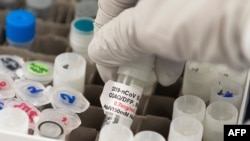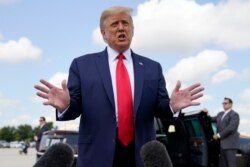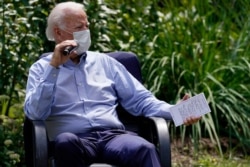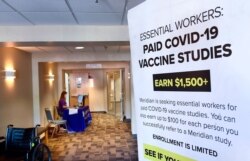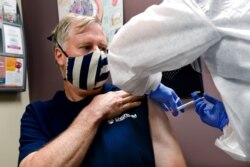Nine chief executives of competing drug companies working to develop a vaccine for the coronavirus jointly said Tuesday they would not seek U.S. government regulatory approval for its use until Phase 3 tests showed it was safe.
The statement comes as President Donald Trump has suggested there could be an announcement on a successful vaccine before the Nov. 3 general election.
"We believe this pledge will help ensure public confidence in the rigorous scientific and regulatory process by which Covid-19 vaccines are evaluated and may ultimately be approved," the executives said in their joint statement.
They vowed the companies would "only submit for approval or emergency use authorization after demonstrating safety and efficacy through a Phase 3 clinical study that is designed and conducted to meet requirements of expert regulatory authorities," including the U.S. Food and Drug Administration.
The executives said they would "always make the safety and well-being of vaccinated individuals our top priority."
In most instances, a statement that drug companies would adhere to safety standards would be unremarkable. But the drug chiefs' statement comes as Trump pushes for a rapid vaccine approval.
At a White House press conference Monday, Trump said vaccine authorization could come "before a very special date."
Accusations from Biden
The presidential election is in eight weeks, when the Republican Trump faces his Democratic challenger, former Vice President Joe Biden.
Biden has accused Trump of mishandling the government's response to the coronavirus, which has now killed more than 189,000 Americans, more than in any other country, and infected more than 6.3 million.
Biden said Monday he would get vaccinated "tomorrow," if a vaccine were available, but only if it was deemed safe by experts.
"I would want to see what the scientists said," he told CBS News. "I want full transparency on the vaccine."
Of Trump, Biden said, "One of the problems is the way he is playing with politics. He's said so many things that aren't true."
Biden's vice presidential running mate, California Sen. Kamala Harris, told CNN on Sunday that she would "not trust" Trump's declarations about the safety of a vaccine coming just before the election.
In response, the White House said, "The American people can rest assured that any approval will maintain the FDA's gold standard for safety and testing to ensure a vaccine or therapeutic is effective. This false narrative that the media and now the Democratic nominee for vice president are suggesting that politics is influencing approvals is not only false but is a danger to the American public."
Politics vs. science
A recent STAT-Harris survey showed that 82% of Democrats and 72% of Republicans were concerned that approval of a vaccine would be driven more by politics than by science. Health experts have voiced fears that if the public does not trust the safety of any vaccine that is made available, many will refuse to be vaccinated, making it less effective in controlling the pandemic.
Trump's top vaccine adviser, Operation Warp Speed co-chief Moncef Slaoui, told National Public Radio last week that it is "very unlikely" a vaccine would be authorized before Election Day.
"There is a very, very low chance that the trials that are running as we speak could (be completed) before the end of October. And therefore, there could be — if all other conditions required for an Emergency Use Authorization are met — an approval," Slaoui said.
The drug executives' statement left open the possibility that an emergency use application for a vaccine could be granted based on partial data from the participation of at least 30,000 test subjects. Such trials normally take years to complete.
"FDA's guidance and criteria are based on the scientific and medical principles necessary to clearly demonstrate the safety and efficacy of potential Covid-19 vaccines. More specifically, the agency requires that scientific evidence for regulatory approval must come from large, high quality clinical trials that are randomized and observer-blinded, with an expectation of appropriately designed studies with significant numbers of participants across diverse populations," they said.
Leaders of AstraZeneca, Johnson & Johnson, Merck, Moderna, and Novavax, as well as those heading two joint vaccine projects, Pfizer and BioNTech, and Sanofi and GlaxoSmithKline, were the signatories of the statement. Combined, the companies said they have created 70 successful vaccines.
The headline on their statement, "Biopharma Leaders Unite To Stand With Science," made clear their attempt to ease worries that a vaccine would be pushed to the market too soon due to political pressure.
Earlier this year, the FDA approved the emergency use of the anti-malarial drug hydroxychloroquine to treat the coronavirus but withdrew approval after clinical trials showed it provided no benefit, while potentially increasing risks of fatal heart arrhythmia. Trump has touted hydroxychloroquine and said he took the drug earlier this year.
The government also recently authorized emergency use of convalescent plasma as a coronavirus treatment. FDA Commissioner Stephen Hahn later apologized for overstating the benefits of plasma transfusions.




